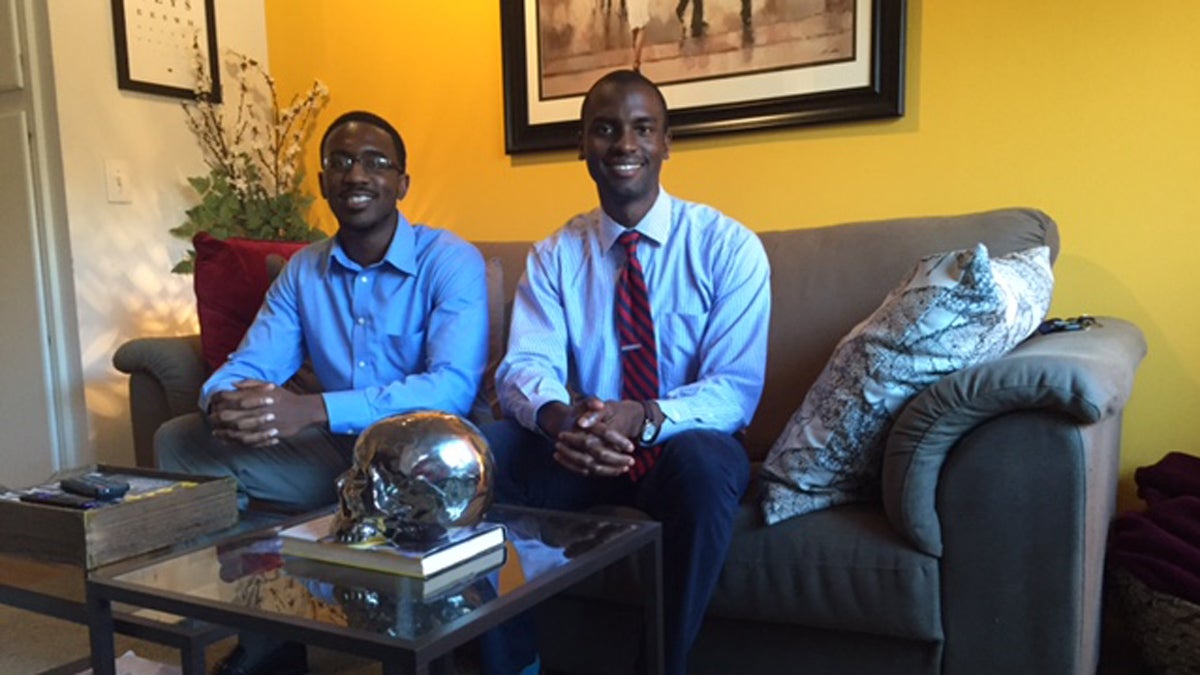Fewer black men applied to medical school in 2014 than 1978
Listen
Jeffrey Okonye and Oviea Akpotaire are fourth-year medical students at UT Southwestern. (Lauren Silverman/KERA)
Turns out, doctors who look like us tend to help keep us healthier. So what does it mean when a particular racial segment of society produces fewer physicians?
After a long day working with patients at the veterans hospital in south Dallas, Texas, Oviea Akpotaire is unpacking groceries with his friend Jeffrey Okonye. The two are fourth-year medical students at University of Texas Southwestern. They’re in a class of 237 people…and they’re two of only five black men.
“I knew the ones above us, below us,” Okonye says. “We all kind of know each other. It’s comforting to see another person that looks like you.”
Here’s the thing: While there are more black men graduating from college over the past few decades, the number of black men applying has actually dropped from 1,410 in 1978 to 1,337 in 2014.
That’s according to a report from the Association of American Medical Colleges. Every other major minority group—including Asians and Hispanics—saw growth in applicants.
“I was really surprised,” says Akpotaire, who is studying internal medicine. “I sent [the study] to my mom and dad immediately.”
Not just a numbers problem
Turns out, increasing diversity among doctors is important for patient health. Studies show people are more likely to follow doctors’ directions on things like medication or exercise if they can relate to them.
Dr. Dale Okorodudu, a third-year pulmonary and critical care fellow at UT Southwestern, says making cultural connections can make a big difference.
“If you can relate to [patients], it’s a lot easier for them to feel at home and comfortable with you,” he says.
Okorodudu wrote a blog post about an experience at Parkland Hospital that stuck with him. He was walking down the hallway on the 10th floor when a black man stopped him:
“It’s good to see you brother!” I had never met this man, but I knew exactly what he was talking about. With a large smile on his face and a look of pride, he extended his arm to give me a handshake. “There aren’t too many of us doing what you do. I’m glad we got some representation in here.”
What’s missing?
For years, Okorodudu has been trying to figure out why so few black men go into medicine. His conclusion: the lack of role models.
“If you’re a black male, let’s say you’re growing up in an inner-city neighborhood,” he says. “There’s so many things directly in front of you that you have the option to go into.”
From music and sports to small business and church, Okorodudu says those professions seem more immediate.
“But when you talk about the medical workforce, none of us are directly there in front of them,” he said.
Okorodudu decided to become a doctor when he was 18. A year from now, when he’s done with his fellowship, he’ll be 32.
Med student Jeffrey Okonye says for kids like him who are into math and science, there are much faster ways to “make it.”
“A lot of friends of mine—black males—are engineers,” Okonye says. “They go to school for four years. They have a job, great pay, even had internships in undergrad I was highly jealous of. Whereas my route, four years undergrad, then another four years of school, and then another X amount of training after that.”
So why’d he take the long route?
“It’s hard to describe the feeling you get when you make someone actually feel better,” Okonye says. “When you can see them go from one state to another and recognize that you were a part of literally changing this person’s life.”
Tools to fix the pipeline
A desire to care for others isn’t the only thing that Okonye, Akpotaire and Okorodudu have in common.
All three have had role models in their families, and all three are the children of immigrants from Nigeria.
Okorodudu says that means the group of 1,337 black men who applied to med school last year is very different from the group in 1978.
“In 1978, those people we’re looking at, a lot of them were probably black American males of slave descent,” he says. “Whereas individuals applying to med school now are actually Nigerian-American. So if we broke it down that way, that factoid is actually even more alarming.”
Alarming, he says, because we’re neglecting a sector of society—African-Americans who’ve been in the U.S. for generations.
The study has some suggestions on how to rebuild the doctor pipeline. Among them: create more mentoring programs, invest in education at K-12 public schools, increase financial aid options and convince medical schools to put less emphasis on standardized tests scores like the MCATs.
Okorodudu is trying to help with an online service called DiverseMedicine. Users connect with mentors on chat or video.
Sometimes, he says, the key to getting kids interested is simply seeing a black man in a white coat.
WHYY is your source for fact-based, in-depth journalism and information. As a nonprofit organization, we rely on financial support from readers like you. Please give today.



